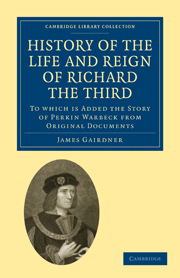 History of the Life and Reign of Richard the Third
History of the Life and Reign of Richard the Third Book contents
- Frontmatter
- PREFACE
- PREFACE TO THE FIRST EDITION
- Contents
- ILLUSTRATIONS
- CHAP. I RICHARD'S CAREER AS DUKE OF GLOUCESTER UNTIL THE DEATH OF EDWARD IV
- CHAP. II ACTS OF RICHARD AS PROTECTOR
- CHAP. III TERMINATION OF THE PROTECTORSHIP
- CHAP. IV MURDER OF THE PRINCES AND REBELLION OF THE DUKE OF BUCKINGHAM
- CHAP. V RICHARD'S GOVERNMENT, HIS PARLIAMENT AND HIS RELATIONS WITH FOREIGN POWERS
- CHAP. VI INVASION OF RICHMOND:—DEFEAT AND DEATH OF RICHARD
- THE STORY OF PERKIN WARBECK
- APPENDIX
- INDEX
- Plate section
CHAP. II - ACTS OF RICHARD AS PROTECTOR
Published online by Cambridge University Press: 07 September 2010
- Frontmatter
- PREFACE
- PREFACE TO THE FIRST EDITION
- Contents
- ILLUSTRATIONS
- CHAP. I RICHARD'S CAREER AS DUKE OF GLOUCESTER UNTIL THE DEATH OF EDWARD IV
- CHAP. II ACTS OF RICHARD AS PROTECTOR
- CHAP. III TERMINATION OF THE PROTECTORSHIP
- CHAP. IV MURDER OF THE PRINCES AND REBELLION OF THE DUKE OF BUCKINGHAM
- CHAP. V RICHARD'S GOVERNMENT, HIS PARLIAMENT AND HIS RELATIONS WITH FOREIGN POWERS
- CHAP. VI INVASION OF RICHMOND:—DEFEAT AND DEATH OF RICHARD
- THE STORY OF PERKIN WARBECK
- APPENDIX
- INDEX
- Plate section
Summary
Council of the Prince of Wales
King Edward had in his lifetime constituted a council for the management of the household and other affairs of his son, the young Prince of Wales, until he should attain the age of fourteen. Among the number originally appointed of this council were the king's two brothers, Clarence and Gloucester, the Earl of Rivers, Lord Hastings, and several other persons of high authority in the state. John Alcock, Bishop of Worcester, was president, Sir Thomas Vaughan was chief chamberlain to the prince, and Sir Richard Hawte controller of his household. These and a few others were always near young Edward's person, by virtue of their offices, while the rest were frequently at a distance. But the Earl of Rivers, his maternal uncle, held the most important post. He was called the young prince's governor, and had the charge of his person and education, and the complete control of his servants.
Will of Edward IV
Young Edward was, at his father's death, in his thirteenth year; and even if his father had lived longer, these arrangements were to have terminated in a year and a half. But of course the mere fact of his being called to the throne made a total change, and it was the will of the deceased king himself that after his death the care of his son's person and kingdom should be transferred to Richard, Duke of Gloucester. This confidence may seem extraordinary, in the light of subsequent events; but as the fact is distinctly recorded by two wellinformed writers of that day, who are by no means friendly to Richard, there cannot be a doubt that such was Edward's real intention.
- Type
- Chapter
- Information
- History of the Life and Reign of Richard the ThirdTo which is Added the Story of Perkin Warbeck from Original Documents, pp. 43 - 75Publisher: Cambridge University PressPrint publication year: 2010First published in: 1898


